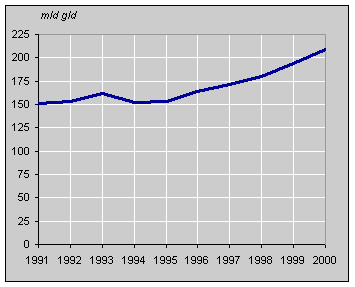Tax revenues increase further in 2000

In 2000 the Dutch central government collected 95 million euro in taxes, nearly 8% more than in the previous year. This put 5 billion euro more in the state coffers than the September budget in 1999 estimated for 2000.
Tax revenues

Largest increase in the last quarter
In the first three quarters of 2000 tax revenues were already 7% higher than in the corresponding period in 1999. But in the fourth quarter of 2000 the central government collected 10% more than in the fourth quarter of 1999. Value added tax, quantitatively the most important source of tax revenue, was even 14% up.
This marked increase was caused by the VAT increase on 1 January 2001, which made it profitable for consumers to purchase large durable items, such as cars and washing machines, before that date.
Budget deficit shrinking
Of the total revenue in 2000, 79 billion euro ended up in central government coffers. Municipalities, provinces and the European Union received a total of 16 billion euro.
The total national budget revenue amounted to 93 billion euro; the state has other sources of income, such as the national lottery, sales of participations and income from sales of natural gas. These generated 14 billion euro in 2000.
Expenditure by the central government (exc. repayments of the national debt) amounted to 95 billion euro, leaving a budget deficit of 3 billion euro. In 1999 this budget deficit was still as high as 5 billion euro.
Laurens Cazander